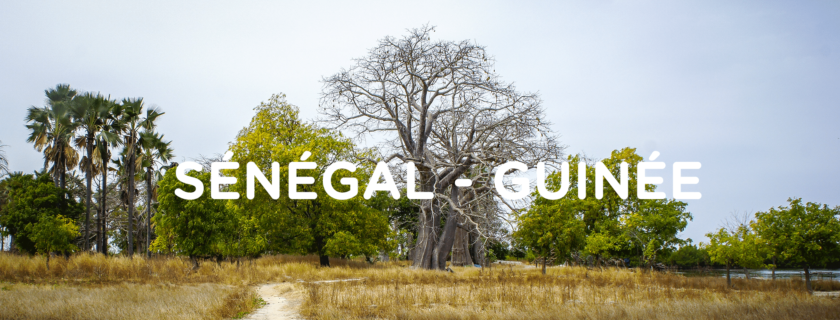|
| |
L’actualité de ces deux dernières semaines a été marquée par la décision des autorités législatives guinéennes de fixer la transition à 36 mois. Cette décision s'inscrit dans la volonté du président du Conseil National de Transition, le militaire Mamadi Doumobouya. Cette annonce a entraîné une mobilisation de la société civile et des partis politiques qui se prononcent largement contre cette décision. Cette contestation a été accentuée par la décision de la junte au pouvoir d’interdire les manifestations durant toute la durée de la transition. Dans le reste de l’actualité, Hamidou Djiba, le porte-parole du Mouvement des Forces Démocratiques de la Casamance (MFDC) a appelé à la paix et aux négociations dans le conflit qui oppose l’État sénégalais aux rebelles indépendantistes casamançais. Au Sénégal, l’imam de Tivouane Peulh, a créé un débat mettant en question l’influence des réseaux sociaux par rapport à la foi islamique. Selon lui, ils constituent des dangers pour les bonnes mœurs religieuses, en plus de pouvoir être des vecteurs de tensions. Par ailleurs, les évêques d’Afrique de l’Ouest, dont ceux de Guinée et du Sénégal, se sont réunis à Abuja dans le cadre des conférences épiscopales d’Afrique de l’Ouest.
The news of the past two weeks has been marked by the decision of the Guinean legislative authorities to set the transition period at 36 months. This decision is in line with what the president of the National Transitional Council, the military officer Mamadi Doumobouya, wanted to put in place. This announcement led to a mobilization of civil society and political parties, which were largely opposed to this decision. This protest was accentuated by the ruling junta's decision to ban demonstrations for the duration of the transition. In other news, Hamidou Djiba, spokesman for the Movement of Democratic Forces of Casamance (MFDC), called for peace and negotiations in the conflict between the Senegalese state and the Casamance independence rebels. In Senegal, the Imam of Tivouane Peulh, created a debate questioning the influence of social networks in relation to the Islamic faith. According to him, they constitute dangers for religious morality, in addition to being vectors of tension. In addition, the bishops of West Africa, including those of Guinea and Senegal, met in Abuja as part of the West African Episcopal Conference.
|
|
|
|
| |
L'info phare - Source médiatique
|
|
|
|
| |
|
La transition guinéenne finalement fixée à 36 mois dans un contexte tendu
En Guinée, l’organe législatif de la transition a adopté le 11 mai le chronogramme qui doit permettre le retour à l’ordre constitutionnel. La durée de la transition a été revue légèrement à la baisse, passant à 36 mois au lieu des 39 proposés par le chef de la junte, Mamadi Doumbouya. Des voix discordantes se sont fait entendre aussi, même si seuls trois conseillers ont voté contre. Les principaux partis politiques réunis au sein du G58 rejettent tout calendrier de la transition validé par le Conseil national de la transition (CNT). La classe politique estime que le CNT n’a ni les prérogatives, ni la légitimité de déterminer la durée de la transition, et souhaitent être consultés.
|
|
Guinean transition finally set at 36 months in a tense context
In Guinea, the transitional legislative body adopted the timetable for the return to constitutional order on May 11. The duration of the transition was reduced slightly to 36 months instead of the 39 months proposed by junta leader Mamadi Doumbouya. There were also dissenting voices, although only three councilors voted against. The main political parties in the G58 rejected any transition timetable validated by the National Transitional Council (CNT). The political class believes that the CNT has neither the prerogatives nor the legitimacy to determine the duration of the transition, and they want to be consulted.
|
|
|
|
|
|
| |
|
Au Sénégal, l’imam de Tivouane Peulh se mobilise contre les réseaux sociaux et ses dangers pour les bonnes mœurs et la cohésion
À l’occasion de son sermon pour l’Aïd el-Fitr (Korité) dans la commune de Tivaouane Peulh, l’Imam Fall a dénoncé ce qu’il appelle “les dérives sur les réseaux sociaux”, ainsi que des dysfonctionnements dans le milieu de la presse. Selon lui, il apparaît nécessaire de réguler la presse et les réseaux sociaux. L’imam a avancé que les réseaux sociaux ont “accentué les dépravations dans le milieu médiatique” et “ont créé un monde où les gens s’envient, se jalousent, s’épient”. Il a par ailleurs rappelé que les réseaux sociaux sont un outil favorisant la diffusion de contenus de désinformation et de contenus pouvant nuire à la cohésion sociale.
|
|
In Senegal, the imam of Tivouane Peulh mobilizes against social networks and its dangers for morality and cohesion
On the occasion of his sermon for the Eid el-Fitr (Korité) in the township of Tivaouane Peulh, Imam Fall denounced what he calls "the excesses on social networks", as well as dysfunctions in the press. According to him, it appears necessary to regulate the press and social networks. The imam argued that social networks have "accentuated the depravities in the media environment" and "have created a world where people envy each other, jealousy, spying. He also recalled that social networks are a tool for the dissemination of disinformation and content that can harm social cohesion.
|
|
|
|
|
|
| |
|
En Guinée, la junte interdit toute manifestation pendant la période de transition
Dans un communiqué lu publiquement le 13 mai, le Comité national du rassemblement pour le développement (CNRD), a annoncé l’interdiction de « toutes manifestations sur la voie publique, de nature à compromettre la quiétude sociale et l'exécution correcte des activités contenues dans le chronogramme jusqu'aux périodes de campagne électorale ». Cette déclaration implique ainsi l’interdiction de toute manifestation pendant les 3 prochaines années. Selon l’organisation de la société civile Front National pour la Défense de la Constitution, cette décision est illégale et illégitime. L’organisation a annoncé qu’elle ne se soumettra pas à cette interdiction et continuera les marches.
|
|
In Guinea, the junta bans all demonstrations during the transition period
In a statement read publicly on May 13, the National Committee of the Rally for Development (CNRD), announced a ban on "all demonstrations on the public highway, likely to jeopardize social peace and the proper execution of activities contained in the timetable until the election campaign periods. This declaration implies a ban on all demonstrations for the next three years. According to the civil society organization "National Front for the Defense of the Constitution", this decision is illegal and illegitimate. The organization announced that it will not submit to this ban and will continue the marches.
|
|
|
|
|
|
| |
La faction civile du Mouvement des Forces Démocratiques de la Casamance appelle à la paix et aux négociations
Chaque année, les 72 heures du livre réunissent à Conakry intellectuels, écrivains et lecteurs du pays. La quatorzième édition de cet événement culturel majeur s’est déroulée du samedi 23 avril au lundi 25 avril, sous le thème de la sauvegarde du patrimoine et de la paix sociale. Un programme qui résonne avec l’actualité. La représentation symbolique d’une case de Dalaba est ainsi mise à l’honneur. Dalaba incarne le patrimoine guinéen, lui-même appelé à jouer un rôle déterminant dans la cohésion nationale. Selon le libraire Samba Kanté, « la réconciliation nationale, on en a besoin aujourd’hui, parce que sans elle, il n’y a pas de développement. »
|
|
Civilian faction of the Movement of Democratic Forces of Casamance calls for peace and negotiations
Hamidou Djiba, spokesman for the Movement of Democratic Forces of Casamance (MFDC), called for peace and negotiations in the conflict between the Senegalese state and Casamance independence rebels. According to him, war is not the solution, because it "will cause a lot of damage, it will create desolation, hatred. Moreover, according to the spokesman of the rebel movement, the military intervention in northern Sindian, which would have allowed the dismantling of all the rebel bases, has not weakened the MFDC.
|
|
|
|
|
|
| |
|
Les conférences épiscopales réunies de l’Afrique de l’Ouest (CERAO) réunis au Nigeria
Le 8 mai, les évêques d’Afrique de l’Ouest se sont réunis dans leur 4ème Assemblée plénière, après une semaine de travaux au secrétariat de la Conférence épiscopale du Nigeria. Dans le communiqué partagé à la fin des travaux, ils dénoncent les maux qui minent les sociétés de l’Afrique de l’ouest et lancent un appel à une vocation chrétienne. Ils ont notamment appelé à la fraternité humaine. Enfin, la CERAO a appelé les politiciens et les autres dirigeants « à mettre de l'ordre dans leur soif sans fin d'auto-agrandissement et d'acquisition de richesses ». La CERAO, regroupe les évêques de 16 pays d’Afrique de l’Ouest dont la Guinée et le Sénégal
|
|
The United Episcopal Conferences of West Africa (CERAO) meeting in Nigeria
The bishops of West Africa met in their 4th Plenary Assembly on May 8 after a week of work at the secretariat of the Nigerian Episcopal Conference. In the communiqué shared at the end of the meeting, they denounced the evils that undermine West African societies and called for a Christian vocation. In particular, they called for human brotherhood. Finally, CERAO called on politicians and other leaders "to put order in their endless thirst for self-aggrandizement and acquisition of wealth. CERAO, which brings together the bishops of 16 West African countries, including Guinea and Senegal
|
|
|
|
|
|
| |
|
En Guinée, un l’imam de la mosquée de Boké appelle les fidèles à continuer les bonnes actions après le ramadan
Les fidèles musulmans de Boké ont célébré l’Aïd El Fitr le 2 mai, à l’instar des musulmans en Guinée et au Sénégal. Elhadj Hassimiou Camara, imam de la mosquée centrale de Boké, a officié la prière, et a invité la communauté musulmane de Boké à continuer les actes d’adoration et les bons comportements pour implorer la grâce et la miséricorde de Dieu. Devant les centaines de fidèles musulmans qui étaient présents sur ce de prière, l’imam de la mosquée centrale a rappelé que les bonnes actions et les bonnes œuvres ne sont pas instituées que pour le mois de ramadan.
|
|
In Guinea, an imam of the mosque of Boké calls the faithful to continue good deeds after Ramadan
The Muslim faithful of Boké celebrated Eid El Fitr on May 2, following the example of Muslims in Guinea and Senegal. Elhadj Hassimiou Camara, imam of the central mosque of Boké, officiated the prayer, and invited the Muslim community of Boké to continue acts of worship and good behavior to implore the grace and mercy of God. In front of hundreds of Muslim faithful who were present on this prayer, the Imam of the central mosque recalled that good deeds and good works are not instituted only for the month of Ramadan.
|
|
|
|
|
|
| |
Ce bulletin de veille est réalisé par l’Observatoire Pharos, observatoire du pluralisme des cultures et des religions, dans le cadre de son projet d'action au Sahel. Il rassemble des informations, analyses et déclarations qui ne reflètent pas systématiquement la perception de la situation par l’Observatoire Pharos, mais qui constituent des documents à intégrer dans l’analyse. Les destinataires, partenaires de l’Observatoire Pharos, sont invités à contribuer à la qualité de cette veille par le partage de toutes informations utiles et diffusables. This newsletter is written by Pharos Observatory, an observatory of cultural and religious pluralism, as part of its project in Niger, Nigeria, Burkina Faso and Mali. It gathers information, analyses and speeches which may not reflect Pharos Observatory's feeling about the situation, but which should be taken into account as part of the analysis. All recipients, who are Pharos Observatory partners, are encouraged to contribute to this Watch by sharing any information that is worthwhile and fit to print.
|
|
|
|




